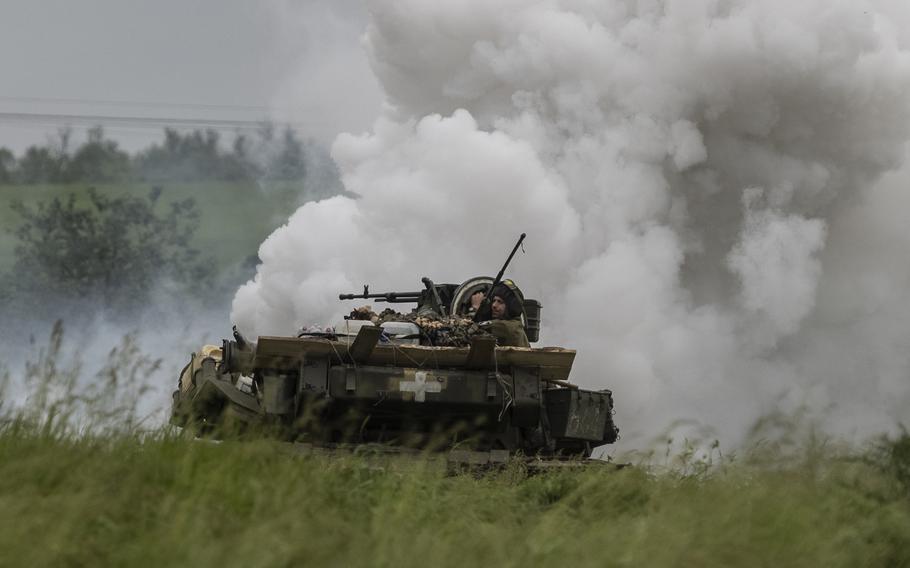
Ukrainian soldiers in a Soviet-era tank during practice maneuvers in the Zaporizhzhia region on May 24. (Heidi Levine/for The Washington Post)
KYIV, Ukraine — The Ukrainian military has launched a long-anticipated counteroffensive against occupying Russian forces, opening a crucial phase in the war aimed at restoring Ukraine's territorial sovereignty and preserving Western support in its fight against domination by Moscow.
Ukrainian troops, including specialized attack units armed with Western weapons and trained in NATO tactics, intensified their strikes on front-line positions in the country's southeast Wednesday night, according to four people in the country's armed forces, beginning a significant push into Russian-occupied territory.
The four military personnel, including officers, spoke on the condition of anonymity because they were not authorized to publicly discuss the battlefield developments.
Russian military bloggers also reported heavy fighting in the Zaporizhzhia region, a part of the front line that has long been seen as a likely location of the new Ukrainian campaign.
By cutting south through the flat fields of Zaporizhzhia, Kyiv's forces could aim to sever the "land bridge" between mainland Russia and the occupied Crimean Peninsula, cutting off crucial Russian supply lines. They could also attempt to liberate the city of Melitopol, which Russia has established as the region's occupied capital, and Enerhodar, where the Zaporizhzhia nuclear power plant is located.
Valeriy Shershen, a spokesman for Ukrainian military units located across much of the eastern and southern front line, confirmed "more activity" in the Zaporizhzhia region but added that he "wouldn't say it's something major." In the Zaporizhzhia region, Ukrainian forces are generally "still in a defense operation," Shershen said in an interview.
Ukrainian officials have said repeatedly in recent days that they would not make an official announcement that the counteroffensive had begun, and that no single action would mark its start.
In the interview, Shershen also described "small counteroffensive activities" of a local scale, particularly the fight for Velyka Novosilka, a village in the Donetsk region just east of the Zaporizhzhia region. The Russians, he added, have stepped up their shelling in the Zaporizhzhia region in anticipation of a possible Ukrainian attack.
The offensive is expected to unfold over the course of months and will serve as a pivotal test of a U.S.-led strategy to prepare Ukrainian forces with the most advanced warfare tactics.
Igor Strelkov, a former officer of Russia's security service who played a brutal role in Russia's illegal annexation of Crimea in 2014 and later its war in the eastern Donbas region, said Thursday that it was clear Ukraine's counteroffensive had begun.
"Perhaps, we can now reliably say that the offensive of the Armed Forces of Ukraine began five-six days ago," Strelkov wrote on Telegram, providing analysis of troop movements at different hot spots along the front.
The counteroffensive is intensifying as a crisis builds in Ukraine's southern Kherson region, where a breach of the Russian-controlled Kakhovka dam and hydroelectric power plant on Tuesday sent water rushing over the banks of the Dnieper River and into dozens of residential communities in Ukrainian- and Russian-controlled territories. The vast flooding has redrawn the battlefield in that part of the southern front.
In the Zaporizhzhia region, fierce obstacles will stand in Ukraine's way. Russian forces have spent months fortifying the area with mines and trenches. A member of one brigade taking part in the offensive in the southeast described "continuous heavy fighting."
"It is very difficult on the field," he said Thursday morning. "Our artillery and aviation are working, but the Russians' are working, as well. It is difficult for us and for them. The armed forces are advancing. But not as fast as we wanted."
Isobel Koshiw in Kyiv, Ukraine and The Washington Post's Natalia Abbakumova in Riga, Lativa; and Francesca Ebel in London contributed to this report.